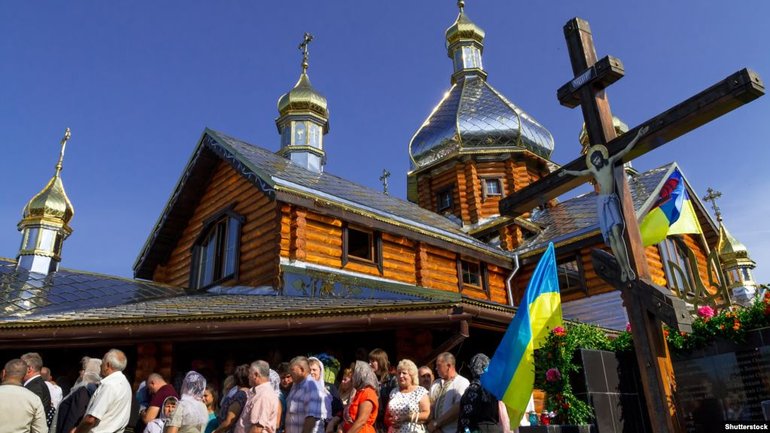UOC MP attempts to prevent the transfer of parishes to the OCU in Transcarpathia

In the "Point of View" section on the Radio Svoboda (Liberty) website, Oleksandr Gavrosh, a writer and journalist, analyzed the recent events in Transcarpathia with the struggle for churches by the UOC-MP, and concluded that "the Moscow church is in opposition to the prevailing public opinion in the region."
According to him, it is significant that people come from outside the village to defend the Moscow-affiliated church, in particular, the infamous Monk Venedikt Khromy, who stands for the Rusyn people's Republic and conducted a live broadcast from the village of Dilove.
As it has been reported, in January 2021, an arson attack was committed against two activists of the local community of the Orthodox Church of Ukraine (OCU) in this Transcarpathian village, which the day before won at the court of appeal their right to use the Church of the Assumption of the Theotokos. However, the UOC of the Moscow Patriarchate) did not agree with this and began to arrange all sorts of obstacles to the decision of the faithful. The legal saga lasted almost two years and finally culminated in a decision in favor of the local Orthodox Church.
In response, the opponents resorted to a violent confrontation, blocking the church, and now to direct physical actions against activists – the coordinator of the religious community and the treasurer.
On his Facebook page, Fr Venedikt Khromy posted the Rusyn separatist flag combined with the slogan of the 75th anniversary of the "Great Victory".
"Such an incongruous mixture is strange for a Transcarpathian, because the local separatists, on the contrary, consider the liberation of Transcarpathia in 1944 an "occupation". But if you consider that Khromy is not a local surname, and he himself graduated from the school of Petrushivka in Chernihiv region, as he notes on his Facebook page, then why be surprised that he does not understand Transcarpathian subtleties? Such "activists" come to Dilove to prevent the community of the local Orthodox Church from living a peaceful religious life, " the journalist writes.
According to him, the situation is similar in the village of Prislip in Mizhgirshchyna, where for almost two years they have not allowed to implement the decision of the local community to transfer to the bosom of the OCU, which has long been legally formalized, including the right to a church and a land plot.
Having lost the courts, supporters of the UOC-MP are trivially resorting to brutal actions. They used similar tactics for years in the confrontation with the Mukachevo Greek Catholic Diocese, when they simply did not allow the judges ' decisions to transfer religious churches to the other side to be implemented. In this situation, representatives of the state authorities demonstrate helplessness in the execution of court decisions. Neither the Executive Service, nor the police, nor the Prosecutor's Office, nor local authorities make any decisions against violators of the law, blessing aggressive lawlessness with their inaction. The Transcarpathian authorities traditionally condone the Moscow church, turning a blind eye to violations of the law on its part," notes Oleskandr Gavrosh.
He claims that such demonstrative military actions of the UOC-Moscow Patriarchate managed to contain the mass transition of believers to the bosom of the OCU. But despite the visible success of Moscow orthodoxy in Transcarpathia, the situation is not so clear. Processes are underway, the journalist says.
According to him, based on the statistical data of the regional state administration, 663 Orthodox communities of Moscow subordination and 94 of the OCU operate in the region. Although the difference is significant, there is a tendency for the gradual growth of the Orthodox Church of Ukraine. In particular, OCU communities are already operating in almost all regional centers and cities: in Uzhgorod, Mukachevo, Beregove, Vinogradov, Irshava, Khust, Tyachev, Rakhiv, Perechin, Chop. That is, in the largest settlements of Transcarpathia, there is already an alternative to Moscow's version of Orthodoxy, which, without a doubt, takes away the share of believers, among whom there are especially many intellectuals.
"The consciousness of the believers themselves is changing. According to polls, the majority of Orthodox transcarpathians consider themselves to be the OCU believers, not the UOC-MP. This paradox is explained by the fact that a minority of those who call themselves believers go to churches. Most transcarpathians spend Sunday watching TV or gadgets, not in God's temple. In fact, the Moscow church finds itself in opposition to the prevailing public opinion in the region. This leads to an increasing slide to the margins, even greater closeness. So, a resounding defeat crowned the electoral campaign of the rector of the largest Orthodox Cathedral of Transcarpathia, Dymytry Sidor, who received as many as 109 votes in the 120-thousandth city. Further religious fragmentation, an increase in the number of religious communities and at the same time a decrease in believers therein will continue to be the main religious trend in Transcarpathia, which will lead to a gradual loss of influence on society," Oleksandr Gavrosh summarizes.









